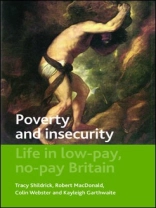Winner of the British Academy Peter Townsend Prize for 2013 How do men and women get by in times and places where opportunities for standard employment have drastically reduced? Are we witnessing the growth of a new class, the ’Precariat’, where people exist without predictability or security in their lives? What effects do flexible and insecure forms of work have on material and psychological well-being? This book is the first of its kind to examine the relationship between social exclusion, poverty and the labour market. It challenges long-standing and dominant myths about ‘the workless’ and ‘the poor’, by exploring close-up the lived realities of life in low-pay, no-pay Britain. Work may be ‘the best route out of poverty’ sometimes but for many people getting a job can be just a turn in the cycle of recurrent poverty – and of long-term churning between low-skilled ‘poor work’ and unemployment. Based on unique qualitative, life-history research with a ’hard-to-reach group’ of younger and older people, men and women, the book shows how poverty and insecurity have now become the defining features of working life for many.
Om författaren
Tracy Shildrick is a Professor of Sociology at Teesside University. She has researched and written widely around issues to do with young people, poverty and worklessness. Robert Mac Donald is Professor of Sociology at Teesside University. He has long-standing research interests in the areas of youth transitions, social exclusion and unemployment. Colin Webster is Professor of Criminology at Leeds Metropolitan University. He has long-standing research interests in ethnicity and crime and poverty and social exclusion. Kayleigh Garthwaite is a researcher in the Geography Department at Durham University. Her research interests focus on health, welfare-to-work and identity












